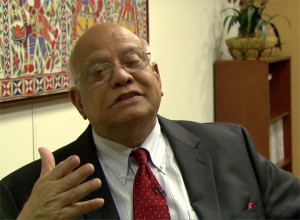The loan classification policy of Bangladesh Bank will most likely be relaxed this month, indicated Finance Minister AMA Muhith.
The move comes in response to demands from garment exporters, who are left staring at huge losses after months of severe disruptions to their businesses owing to political turbulence.
They said the current loan classification policy, which marks a loan to be classified when the repayment period overshoots by three months, is “killing” them. Although they are still eligible for new loans, the banks put excessive pressure on them to make their payments, reports the Daily Star.
“I think we will have to do something about it,” the minister said during a meeting with top leaders of the three main garment manufacturers’ platforms at his secretariat on Wednesday.
 At the meeting, Atiqul Islam, president of the Bangladesh Garment Manufacturers and Exporters Association (BGMEA), presented a three-point demand to make up for the excess cost incurred by garment owners following the latest hike in wages and another eight-point demand to compensate the losses suffered due to political unrest.
At the meeting, Atiqul Islam, president of the Bangladesh Garment Manufacturers and Exporters Association (BGMEA), presented a three-point demand to make up for the excess cost incurred by garment owners following the latest hike in wages and another eight-point demand to compensate the losses suffered due to political unrest.
Muhith said, “I am telling you, you will get the decision this month. In fact, we will give out this decision in the next few days.”
Specifically, the garment makers urged the government to bring down the tax on export earnings to 0.25 percent from 0.80 percent.
They also called for special loans for four months between November this year and February next year so that they can recover the losses incurred in recent months due to worker unrest and political violence. The loans will be paid in two years.
In another demand, they said all existing term loans and forced loans in the textile, garment and backward linkage industries should be given a grace period for two years and transferred without any interest to a block account.
The BGMEA chief also said there should be an exit plan for the garment industries which would not be able to run their plants under the current scenario.
On the demand, Muhith said it would not be possible to formulate any laws to help them exit the industry without any trouble. “We could however prepare a draft.”
Islam also said many sound factories are closing down due to unhealthy politics. “International buyers in letters have conveyed that they are considering shifting orders from Bangladesh to other countries in the backdrop of political instability and violence.”
Anwar-ul-Alam Chowdhury Parvez, a former president of BGMEA, said production in factories has fallen by 10-20 percent due to the political volatility.
AK Azad, former president of Federation of Bangladesh Chambers of Commerce and Industry (FBCCI), said at present only the Dhaka-Chittagong route has been kept operative in a last-ditch effort, while the transportation of goods from land ports including Benapole has been completely stopped.
Nurul Amin, chairman of Association of Bankers-Bangladesh, said they are sympathetic with the demands of the garment sector.
“If the garment makers can’t do business the banks’ income will also fall. But the related regulations of the central bank have to be relaxed,” he said.
The garment sector, which accounts for about 80 percent of the country’s total exports, has been under tremendous pressure for the last few months.
As a result, the garment makers are not being able to bring imported raw materials to their factories from Chittagong port and export the finished goods on time, according to BGMEA. The situation has forced the exporters to go for expensive air shipment to meet deadlines.
Between January and September this year, 1.32 lakh tonnes of goods were air-shipped, imposing a financial cost of over Tk 4,000 crore, said the BGMEA chief.
















